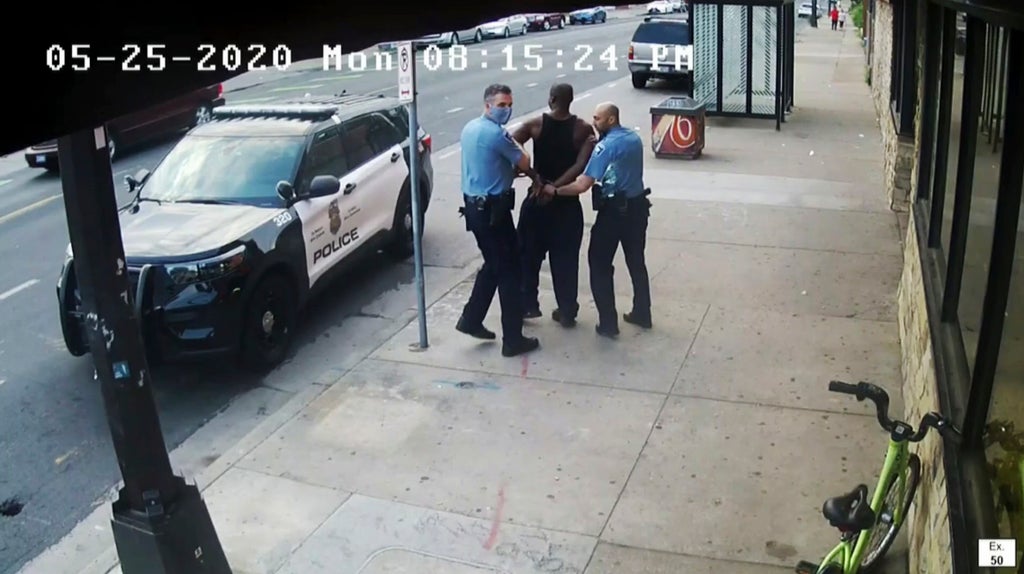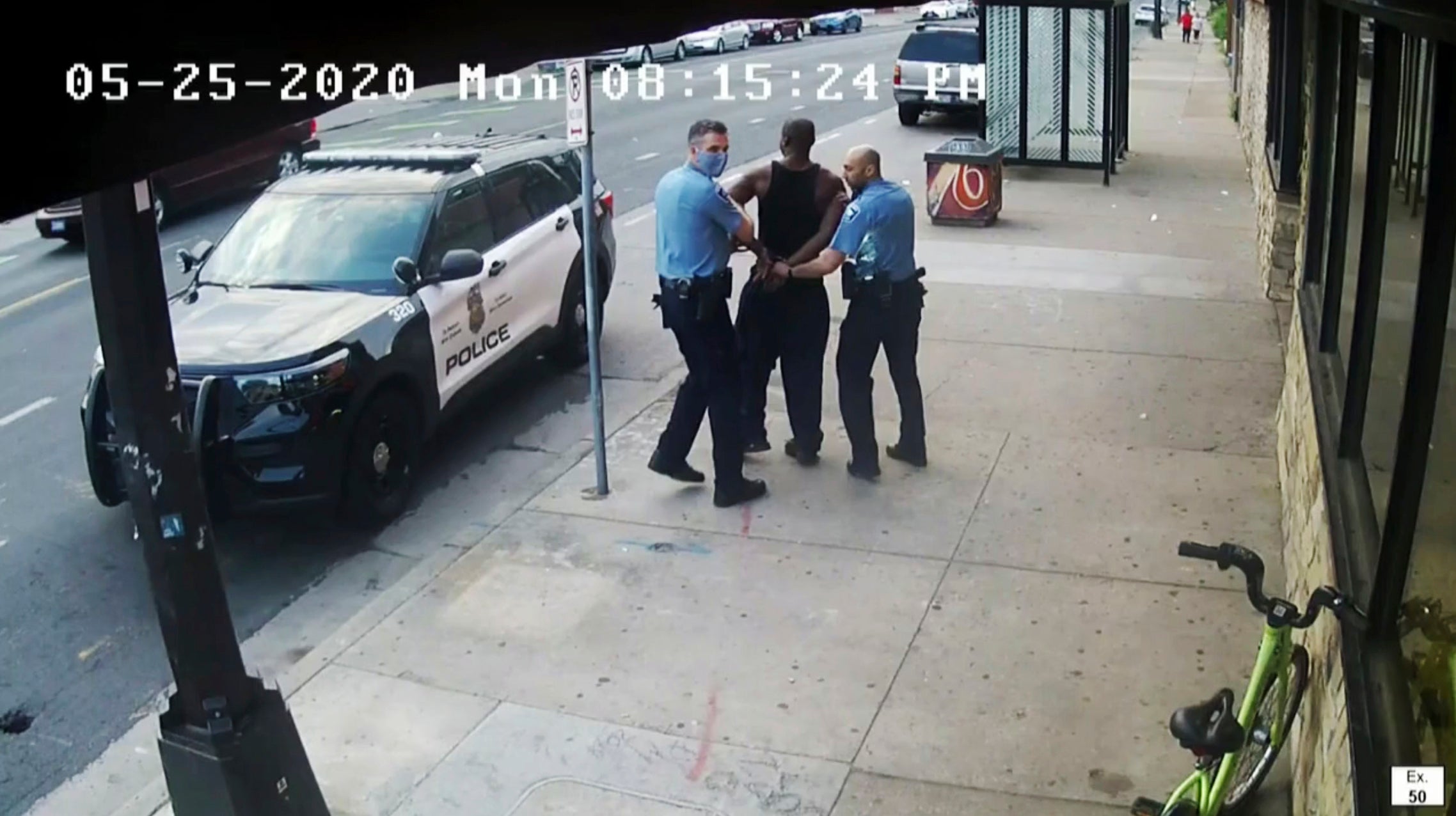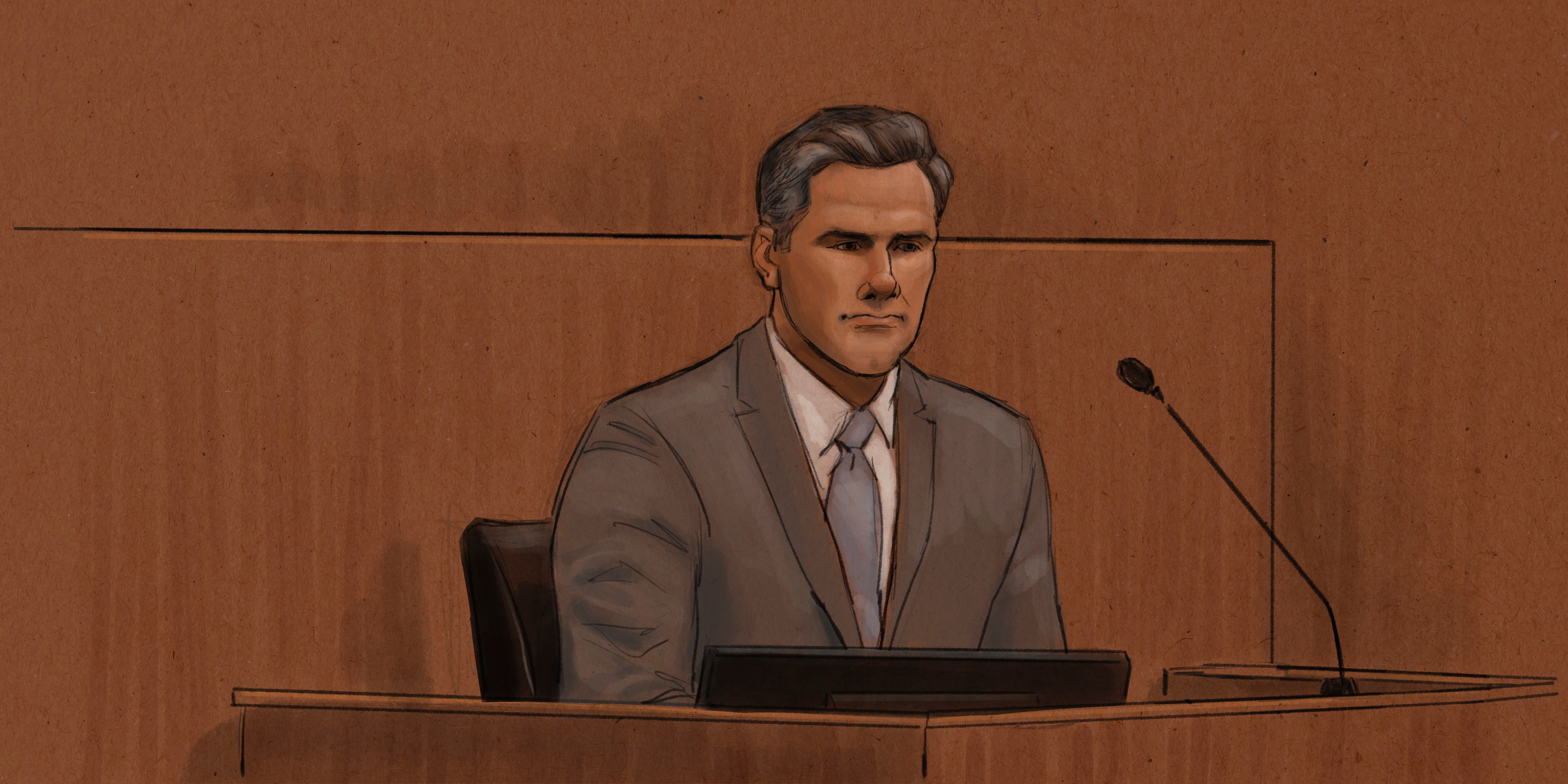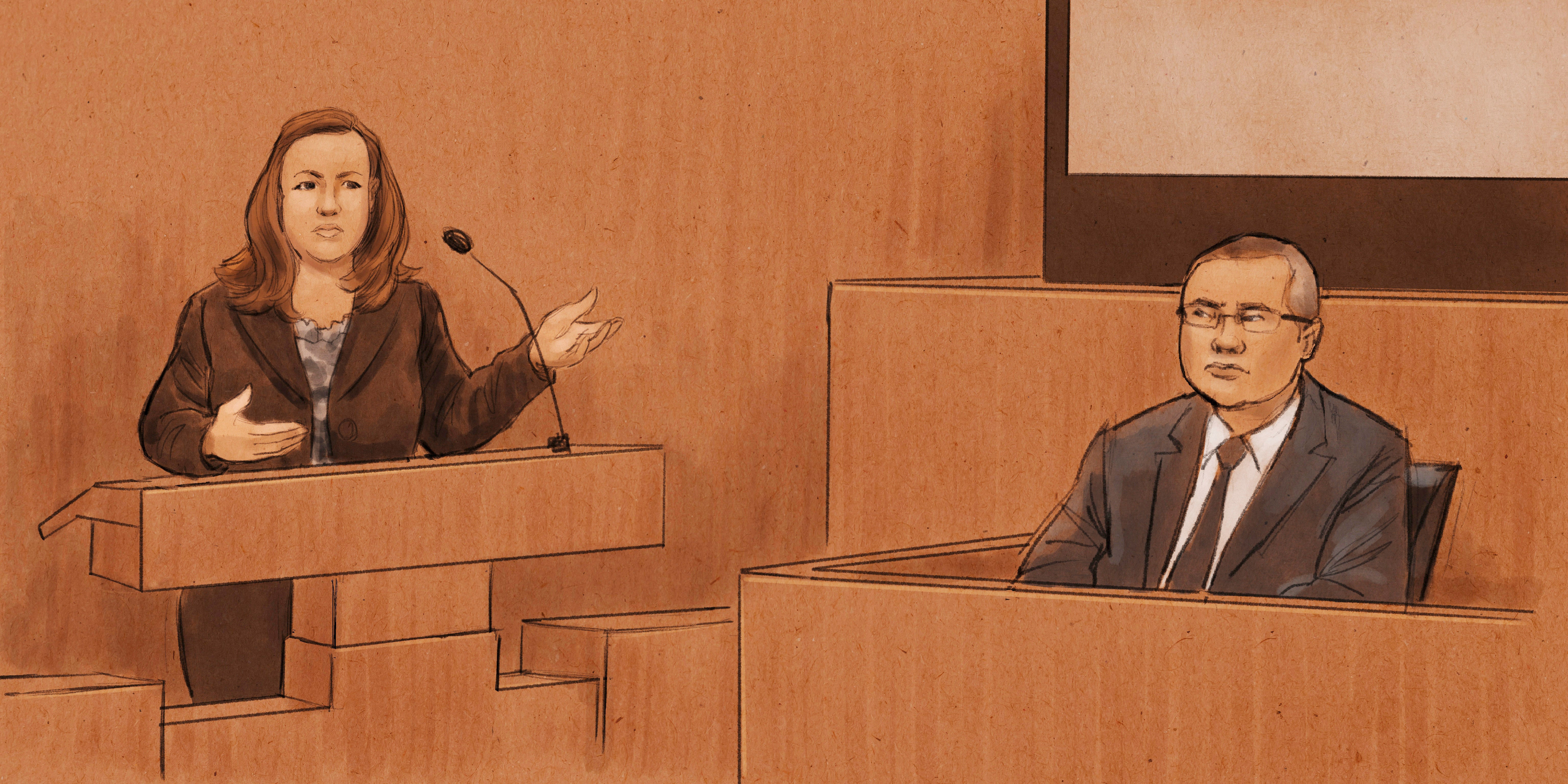
The lawyer for one of the former Minneapolis police officers charged in connection with George Floyd’s death has called for his acquittal, saying that a “tragic ending does not mean it is a crime”.
Robert Paule said in closing arguments on Tuesday that Tou Thao did not act with “bad purpose or improper motive” when he failed to stop Derek Chauvin from murdering the Black man on Memorial Day 2020.
“There is only one reasonable verdict, and that verdict is not guilty. Remember, just because something has a tragic ending does not mean it is a crime,” he told the court.
Mr Thao, a veteran officer of eight years who held back bystanders and stopped them intervening in the fatal encounter, is standing trial alongside fellow former officers J. Alexander Kueng and Thomas Lane on federal charges of violating Floyd’s civil rights.
All three are charged with one count of depriving Mr Floyd of his civil rights by failing to provide him with medical care. Mr Thao and Mr Kueng are also charged with one count of depriving Mr Floyd of his civil rights by failing to intervene to stop Chauvin’s unreasonable use of force.
Both counts, which relate to what the officers did not do rather than the action they took that day, allege the officers’ actions resulted in Mr Floyd’s death.
All three officers have pleaded not guilty to the charges.
Closing arguments got underway on Tuesday, with prosecutors telling the court that none of the three officers did anything to try to stop Chauvin or to try to save the life of Mr Floyd.
“They did nothing to stop Derek Chauvin or to help George Floyd. You know it because you’ve seen it,” said prosecutor Manda Sertich.
The prosecutor dismissed the argument made by all three defendants that they were following the orders of Chauvin - the senior-most officer on the scene that day.
“Officer Chauvin isn’t ordering these defendants around, he’s barely talking to them,” she said.
Instead, she said the officers made a “choice” not to act.
“The officers knew George Floyd couldn’t breathe, and was dying,” she said.
“They chose to do nothing, and their choice resulted in Mr Floyd’s death.”
Ms Sertich pointed to the last words from Mr Floyd as he begged for air saying “I can’t breathe” before losing consciousness and dying under Chauvin’s knee.
“The knee on my neck. I’m through. I can’t breathe, officer. Please help me. I can’t breathe. They’re going to kill me. I can’t breathe,” she recounted, according to KARE11.
“Then one last time: ‘Please, I really can’t breathe’.”

The prosecutor pointed to each of the three officers’ individual actions to show how they deprived Mr Floyd of his civil rights during the encounter.
Mr Thao watched as Mr Floyd died under Chauvin’s knee “right before their eyes” and, instead of stepping in to stop Chauvin, argued against bystanders who were begging him to intervene, she said.
"Instead of tapping Chauvin on the shoulder, he would argue and belittle people asking him to do what the law requires, not to mention common decency and sense," she said.
Ms Sertich pointed to Mr Thao’s comment at one point to the bystanders that “this is why you don’t do drugs, kids” about Mr Floyd.
Mr Kueng, a rookie officer who was only days into the job, was pinning Mr Floyd down by kneeling on his back.
The prosecutor said Mr Kueng ignored the 46-year-old begging for help and “didn’t tap Chauvin on the shoulder or ask him to move his knee off Floyd’s neck”.
The jury was shown a still image from Mr Thao’s bodycam which showed Mr Kueng “laughing with Chauvin” and was told how he picked gravel out of the tyre of the squad car all the while failing to make any attempt to stop Chauvin.
“Not one statement, not one gesture, not one physical intervention” to stop Chauvin, the prosecutor said of the two.

To find Mr Thao and Mr Kueng guilty of failing to intervene to stop Chauvin, the jury has to find that they knew the senior officer was using unreasonable force and failed to stop him.
Meanwhile, Mr Lane is only charged with one count after he was heard asking twice if the officers should move Mr Floyd to another position.
Chauvin said no, with Mr Kueng parroting the senior officer on one occasion.
The prosecutor told jurors that Mr Lane’s suggestion that Mr Floyd should be moved shows that he was aware that the Black man was in need of medical attention.
However, Mr Lane failed to stop “the horror right under his nose”, meaning the jury should find him guilty on that single count, she explained.
“You know he affirmatively chose not to do anything – because you know what was going on in his head at that moment,” she said.
“He did nothing to give Mr Floyd the medical aid he knew he so desperately needed.”
On the charge of failing to administer medical care, the prosecutor said that jurors only needed to determine that the officers knew Floyd was in distress and did nothing about it.
Ms Sertich explained that “wilfulness” – which is referenced in both charges – does not mean that the officers intentionally wanted to hurt Mr Floyd. Instead, it means that they showed a deliberate indifference to him.
“It’s not complicated,” she said, urging the jury to use their common sense and arguing that the bystanders were aware Mr Floyd was in need of medical attention - and so too were the officers.
“Anyone can recognize that someone with a knee on their neck, who has slowly lost their ability to speak, stopped moving and has gone unconscious has a serious medical need,” she said.
Mr Paule was first to give the closing arguments for the defence, calling Mr Floyd’s death a “tragedy” but that prosecutors cannot show that Mr Thao’s actions match the definition of “wilful”.
“You’d have to find ‘a bad purpose or improper motive’,” he said.
Mr Kueng’s attorney Tom Plunkett followed with a similar argument that his client did not “wilfully deprive Mr Floyd of his rights”.
Mr Plunkett pointed to the defence Mr Kueng laid out when he took the stand last week.
Mr Kueng had testified that he was let down by the Minneapolis Police Department because of its poor training and deferred to following the orders of Chauvin – a 19-year officer and his field training officer.
“I’m not trying to say he wasn’t trained. I’m saying the training was inadequate to help him see, perceive and understand what was happening here,” Mr Plunkett told the jury.

The attorney for Mr Lane, who held down Mr Floyd’s legs during the arrest and like Mr Kueng was only a few shifts into the job, was last to deliver closing statements.
Earl Gray, who represented Kim Potter in her manslaughter trial for the shooting death of Daunte Wright, also sought to push the blame onto Chauvin.
“It’s common sense. If you’re a rookie four days on the job and you have a veteran next to you during a crisis? You look to him. That’s common sense,” he told jurors.
Mr Gray also pointed to the testimony of a paramedic at the trial, who said that Mr Lane had given CPR to Mr Floyd in the ambulance.
“Doesn’t that show that he was not deliberately indifferent?” he questioned, claiming the rookie officer was charged because of “mob rule and politics”.
All three former officers took the stand at their trial last week.
Chauvin reached a plea deal with federal prosecutors in December, pleading guilty to the civil rights charges in exchange for avoiding joining the trio on trial and being moved to federal prison.
This came after the veteran officer of 19 years was convicted of murder and manslaughter at his state trial in April.
Mr Thao, Mr Kueng and Mr Lane also face trial on state charges of aiding and abetting murder and manslaughter. The trial has been delayed multiple times and is now expected to begin in June.
Associated Press contributed to this report







